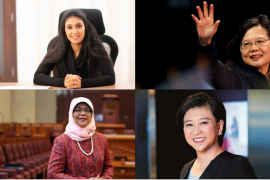Raya Al Hassan has shaken up the ministry much to the liking of the Lebanese people. During her brief three-month tenure in the job, Lebanon’s Interior Minister Raya Al Hassan has broken one record after another, earning her an overnight army of admirers—and critics. Ten years ago, she was appointed as the country’s first finance minister, and now, as the region’s first female interior minister. A graduate of the American University of Beirut (AUB), Al Hassan is a member of Prime Minister Sa’ad Hariri’s Future Movement.
Tearing Down Roadblocks
Al Hassan, 52, kicked off by tearing down concrete walls draped with barbed wire, surrounding her ministry at the Sanayeh neighbourhood in Ras Beirut. They were unnecessary, she claimed, creating traffic congestion and feelings of danger among residents of Beirut—a feeling that top officials were afraid and corroding themselves behind high fortified walls. They had been erected by her predecessor Nouhad Machnouk, a fellow party member in Hariri’s Future Movement. She then dismantled the roadblocks surrounding the home of Parliament Speaker Nabih Berri, a ranking member of the rival March 8 Coalition. Eating up a large area of the posh residential Ramla Al Baydah neighbourhood, they had been erected five years ago, when Daesh, carried out a series of terrorist attacks within Lebanon.
Al Hassan was sending a powerful message to all heavyweights in the complex web of Lebanese politics, saying that she would spare neither Sunnis nor her own party nor Shiites of rival factions. She is now planning a visit to Dahiyeh, the Hezbollah stronghold in southern Beirut—previously off-limits for the interior ministry—making sure that its leaders also comply with her orders. “Removing these blockades, which serve little purpose today and create a false sense of insecurity have been roundly met with praise,” said prominent Lebanese journalist Timour Azhari of The Daily Star.
Her actions, he said, are seen as moving away from the security-centric policy that defined her predecessor’s term. Al Hassan’s self-stated intention, he said to Gulf News, was to “improve the relationship between the people and the state.”
Airport and Border Security
Travelers landing at Rafik Hariri Airport have said that officials are showing far greater efficiency since Al Hassan took over on January 30, 2019.
“It took me 20 minutes to pass through passport control, get my luggage, and leave the airport” said Christian Mansour, a Montreal-based Syrian dentist.
“It’s never been as easy and quick as it was now, and the Lebanese border officials have never been as welcoming. All of them wear big smiles across their faces.”
“We, as Syrian expatriates of tourists used to feel unwelcome in Lebanon,” added Ramez Dassouki, a Syrian student living in Brussels who uses Rafik Hariri Airport to reach Damascus because international flights don’t land in his city anymore. “They used to throw our passports around and snap at us, although we are neither asylum seekers nor refugees. This time, it was very different. They were extremely polite.”
This month, Al Hassan announced that twelve additional passport control counters will be opened by June 2019, in order to further help passengers, increasing their number from 22 to 34.
Civil Marriage
Last February, Al Hassan caused more waves by saying she supports the idea of civil marriage—a highly controversial topic that has been on the table of Lebanese lawmakers since the 1950s. Civil marriage is not available and people must be married through their respective religious affairs ministries. None of them agreed to take any action, fearing backlash from the country’s numerous religious communities.
“I personally prefer if there was a framework for civil marriage” said Al Hassan, adding: “This is something that I will try to open room for serious and deep discussion.”
“The Future Movement sometimes likes to put forward a more modern image,” said Mona Sukkarieh, co-founder of Middle East Strategic Perspectives, a Beirut-based political risk consultancy.
Speaking to Gulf News, she added: “This could go as far as floating ideas that could be perceived as too bold or too liberal by its largely conservative base.”
But on previous occasions, “it rarely had the courage to go all the way and challenge its conservative base and the religious establishment. It usually tends to put such plans on hold when the situation becomes critical, leaving the more liberal segments of society with a sense of unfinished business.”
“It is unlikely that this time around is going to be different,” she said.
Al Hassan has only “rekindled” the debate on civil marriage, said Azhari, without committing herself to registering civil unions “a power which she could exercise.”
“Here I believe Al Hassan will have to balance her reformist tendencies with her position as a top government official from the Future Movement Party, which seeks to represent Lebanon’s Sunnis. I think that ultimately she may choose not to push for civil marriage given the uproar it would cause from the Sunni religious establishment.”
While many Lebanese are happy with Al Hassan’s actions thus far, some say it is still too early to judge her.
Recent measures were a “good step” but more needed to be done, Wala Harb, an instructor at the Lebanese American University (LAU) told Gulf News.
“She should work on giving Lebanese women the right to give the nationality to their children, or for example, or apply laws regarding the violence that women are exposed to or improve their state in marriages and give them the maternity rights.”
Source: Gulf News




